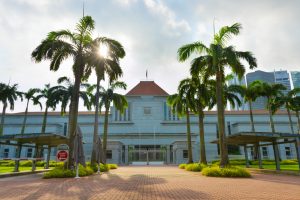On Monday, Singapore introduced a proposed new law that will empower the government to order the removal of any online content deemed to be part of a “hostile information campaign” orchestrated by a foreign power.
The Foreign Interference (Countermeasures) Act, which was tabled in parliament yesterday, will arm the Ministry of Home Affairs with a range of tools to fight hostile information campaigns, or HICs, in bureaucratic parlance.
These include powers to compel internet and social media platforms to disclose information on users, remove content, and block user accounts. The law also gives authorities the power to prevent apps from being downloaded in Singapore, if those apps are known to be used by foreign principals to conduct hostile information campaigns.
In a statement on the proposed law, the Ministry of Home Affairs argued that foreign interference, particularly the use of online tools to mislead or incite users and advance a foreign country’s interest, “poses a serious threat to [Singapore’s] political sovereignty and national security.”
“Hostile foreign actors can seek to mislead Singaporeans on political issues, stir up dissent and disharmony by playing up controversial issues such as race and religion, or seek to undermine confidence and trust in public institutions,” said the statement.
It said that Singapore was especially vulnerable to such influence, given its open, highly digitally connected and diverse society. “We are strengthening our detection and response capabilities, as well as Singaporeans’ ability to discern legitimate and artificial online discourse,” it said. “To complement these efforts, our laws need to evolve, just as other countries have introduced new laws to tackle foreign interference.”
The home affairs minister will be empowered to issue “technical assistance direction” to social media services to disclose information required “to determine if the harmful communications activity is being undertaken by or on behalf of a foreign principal,” the statement said.
The bill also allows the government to designate individuals and groups directly involved in Singapore’s political processes as “politically significant persons” who will be subject to “measures” to mitigate their susceptibility to foreign interference.
While the statement did not single out any particular nation by name, it hinted obliquely at the main source of its concerns by referencing two recent incidents involving alleged China-linked influence activities in Australia and the European Union. Neither mentioned China by name, referring only to a “foreign country,” while a further reference to geopolitical tensions with China referred to it as “another country.” This silence was all the more glaring considering that the statement made explicit reference to a case of “interference” by a U.S. diplomat in Singapore in the 1980s.
This reticence reflects Singaporean officialdom’s concerns about a recent increase in Chinese outreach and influence efforts targeting Singaporean Chinese, part of the Chinese government’s wider pitch to members of the “Chinese family” overseas. In particular, there are fears that the Chinese government is seeking to convert the ethnic and cultural affiliations of Singaporean Chinese, which make up around 75 percent of the city-state’s population, into support for Beijing’s political goals.
In a public lecture in June 2018, Bilahari Kausikan, the former permanent secretary of the Ministry of Foreign Affairs, warned that pro-China narratives were being seeded, through word of mouth and Chinese social media apps like WeChat, in a bid to sway Singaporean Chinese sentiments in the Chinese government’s direction. He called on the country’s citizens to resist any attempt to “impose a Chinese identity on Singapore.”
While these concerns are well-founded, whether their seriousness warrants the powers contained in the foreign interference bill remains a more open question. As journalist and human rights advocate Kirsten Han noted yesterday in a useful Twitter thread about the foreign interference legislation, the legislation defines the act of “engaging in conduct on behalf of a foreign principal” very broadly.
Indeed, she argued that it “could apply to all sorts of legitimate activity undertaken by civil society organisations and independent media outlets” receiving funding from a foreign source, pointing to the Singaporean government’s recent upbraiding of the U.S. Embassy for hosting a webinar with Oogachaga, a local LGBTQ+ advocacy group.
Given the parliamentary majority enjoyed by the ruling the People’s Action Party (PAP), the passage of the new law would seem to be a foregone conclusion. What exact impact it has on Singapore’s already straitened media and civil society remains to be seen.

































